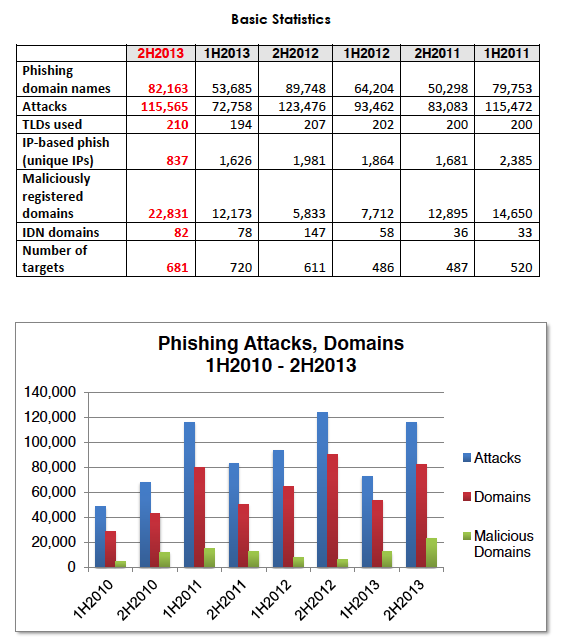 Phishing remains pervasive across the online world, driven by an explosion of attacks in China and hackers across the world diversifying their targets, according to a new report.
Phishing remains pervasive across the online world, driven by an explosion of attacks in China and hackers across the world diversifying their targets, according to a new report.
In its Global Phishing Survey 2H2013 issued on April 10, the Anti-Phishing Working Group said 85% of the domain names registered for phishing in the second half of 2013 were used on Chinese targets, and that the overall number of phishing attacks jumped 60% from the first half of 2013 to the second half of 2013 (72,758 to 115,565).
(Click on image at left to expand.)
Meanwhile, PayPal was the most-targeted single institution, with 24,580 attacks, for 21% of the total, the APWG said, and phishers armed with malware also went after large and small banks in Latin America, India and the Arab world, the APWG said. They also targeted sites ranging from Hertz Rent-a-Car to bitcoin's Mt. Gox to jeweler Tiffany & Co., Home Depot and Boise State University, the APWG report said.
“It appears that almost any enterprise with an online presence can be a phishing target. If a site takes in personal data, then there may be phishers who want to exploit it,” said the report's authors, Greg Aaron, president of Illumintel Inc. in Willow Grove, Pa., and Rod Rasmussen, president/CTO of Internet Identity in Tacoma, Wash.
“We counted 681 unique target institutions during the period, down slightly from the 720 found in 2H2012. Of the 681 targets that were phished in 2H2013, almost half of them – 324 to be precise – were not phished in 1H2013,” the report said.
“This is an unusual amount of churn, or turnover, and shows phishers trying out new targets. They appear to be looking for companies that are newly popular, have vulnerable user bases, and/or are not ready to defend themselves against phishing,” Rasmussen and Aaron wrote.
The fight against phishing also continues, the report noted, saying that the average uptimes of phishing attacks were close to historic lows of just less than 36 hours, compared with a high of about 72 hours in the second half of 2010.
The APWG coalition collects data for its twice-yearly reports from several phishing feeds and private and industry sources and said it continues as the Internet's most comprehensive archive of phishing and e-mail fraud activity.
© Touchpoint Markets, All Rights Reserved. Request academic re-use from www.copyright.com. All other uses, submit a request to [email protected]. For more inforrmation visit Asset & Logo Licensing.






